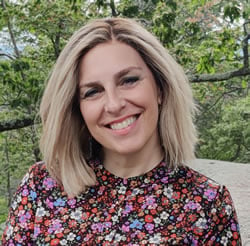
The Talmud offers a vivid description of how every night at midnight, the Shechinah weeps bitterly for the Jewish people who are still in exile, and for our world which has yet to experience redemption.
As part of our own yearning for the redemption, we are meant to meditate on this and feel the depth of pain experienced by the Shechinah. Our longing for the redemption, we are told, is not only about ridding ourselves of our personal or communal distress, but also about empathizing with how much greater G‑d's pain must be for us.
To be honest, I've always found this concept very difficult. How can I fathom G‑d's pain, when He is the cause of our remaining in this bitter exile? Should I feel sorry for someone who in the process of hurting or punishing others gets hurt himself?
I read about the horrific persecutions throughout history, endured in almost every century and country by our people, who were seemingly abandoned to their vicious tormentors.
On another level, to this day, I see and feel with my very own eyes and heart the suffering of so many around me who confront their own agonizing misfortune—from health issues, to premature deaths, to the inability to have children, to desperate financial woes. And the list of troubles goes on, endlessly.
Shouldn't my emotions be aroused to sympathize with my fellow brethren rather than a G‑d who, on the face of it, distances Himself from our world and our suffering?
It's a question that honestly I have never become totally reconciled with. Maybe it's one of those things we are not meant to grasp, or maybe I just need to try harder and learn more.
When I became a mother, I began to relate in a deeper way to the notion that one who watches the agony of a loved one may, in fact, be in greater pain than the sufferer himself.
I remember once, shortly after I had given birth to my first child, seeing a haunting picture of another mother, in a vastly different situation than mine.
She was a gaunt woman living in a Third World country holding in her arms a malnourished, wretched, wailing toddler. It was clear that her son was crying from hunger. From her vacant eyes looking out to the world, it was also obvious that the pain of this mother's affliction was too difficult for her to bear. Too difficult for anyone to bear.
At that moment, when I looked deeply into the dark eyes of this bent over, young, but so aged, woman, I almost thought that I was looking at the Shechinah herself.
Though the woman was emaciated, her silent cries were not over her own predicament, but rather over her child's torment. As he begged her for a dry crust of bread or a drop of water to moisten his parched throat, her greatest pain, more than any of her own hunger pangs could ever be, was in refusing his needs.
And, so I thought, how anguished G‑d must feel each time He stifles our cries. For every moment He keeps us in exile. For every heartfelt prayer that He refuses. And for every cheek drenched in tears that He turns away.
But immediately another voice countered, almost angrily, that this analogy does not stand. While the mother in the picture cannot provide for her children, despite her best attempts, G‑d is in a position where He can easily, in the blink of an eye, without even any degree of effort—fulfill our every desire and remove any vestige of pain, want and need from our midst.
So the question remained—and remains still.
A while ago, Rhoda began attending my classes and we soon became good friends. Though I still cannot claim to have found an answer to my question, the circumstances of Rhoda's life have provided me with perhaps, a little bit more awareness.
Rhoda is a wonderful, sweet person, always ready to do a favor and help out in any time of need, with true joy. But Rhoda lives under the shadow of a very difficult situation that dims her sunny disposition and brings darkness and torment into her life.
From the outside, Rhoda's life is ideal—she lives in a luxurious home and has no financial worries, but few people are aware that Rhoda's husband is a severely addicted alcoholic.
Over the years, I've watched Rhoda, a naturally optimistic person, turn into a bitter, suspecting, and often emotionally detached individual. Her days have become consumed with "fixing" her husband of his alcoholism. I've seen her try every method she can—from nagging, manipulating and begging, to threatening, punishing and withholding.
Rhoda's caretaking has become compulsive and self-defeating. She has begun making excuses for him to keep him from suffering the consequences of his behavior, but her repeated rescue attempts only enable her husband to continue on his destructive course and to become even more dependent on her. Rhoda feels helpless in the relationship, yet unable to break away from the cycle of behavior that poisons it.
After being friends with Rhoda for a long time, I discovered that Rhoda's response to her husband had a psychological name. Her condition is called co-dependency.
I also learned that co-dependency is not only something applicable to spouses of alcoholics or addicts. According to some psychologists, co-dependency is a condition that is predominant in our society, existing any time there is an unhealthy reliance on another for the fulfillment of one's life's dreams and wants.
Co-dependents are addicted to their dependency on another person and believe they can't function without the relationship that they have with that person. Their very sense of self becomes blurred and they are incapable of discerning where they end and the other begins. Co-dependents take on the problems of others as their own and knock themselves out to take care of things for others that these people could actually do for themselves.1
Why am I telling you about Rhoda?
Because perhaps Rhoda and her co-dependency can shed some light on our relationship with G‑d.
The Sages tell us that our physical world is a mirror of its spiritual source. Everything that happens down here—both good things and bad—is a reflection of a parallel divine reality. That reality is, of course, essentially positive; the negativity that we experience "down here" is but a surface corruption of a deeper, wholly positive truth.
Moreover, everything that we see here in our world is meant to be a lesson to us, to reflect upon and find a greater wisdom and understanding of G‑d's relationship with our reality.
So, as I learned about co-dependency, I kind of got the impression that there is an element of "co-dependency" in our relationship with G‑d.
Of course, one doesn't think of G‑d as being "dependent" on anyone or anything. G‑d is perfect, infinite and complete. And yet, G‑d chose to depend on our efforts and actions here in this world in order to bring about the completion of creation, with the long-awaited redemption. G‑d is waiting for us, to change ourselves in order to bring His idyllic dream to our world. He has made His own completeness, so to speak, to be realizable only in His relationship with us.
But the problem is that we've got this terribly addictive condition that doesn't quite allow us to act as whole as we would like. We are captivated with our selfish urges and neuroses, and trapped in the dysfunctional state of galut or spiritual "exile." As much as we want to get out of it, we can't quite shake it. And G‑d, by His own choosing, is "stuck" in the relationship with us, suffering with us.
The whole of human history bears the hallmarks of this co-dependency. There are periods when G‑d "takes over" to make things right (which ultimately doesn't change the fundamental problem, since we are still flawed). These are followed by periods of "withdrawal"--painful to both of us, since we both won't let go of this notion that our fulfillment and completion is co-dependent.
And the cycle, like the co-dependent cycle, continues on and on.
The irony is that the longer G‑d punishes us with exile, the more, like Rhoda's husband, we resist self-change and the more that this condition becomes so embedded within us. He—and we— have been waiting for an awfully long time for it all to end. Since the day that G‑d created the first man and woman and made them indispensable to the fulfillment of His purpose in creation.
But as I further pursue my research, I find that some psychologists believe that co-dependency, at its core, is not a negative trait. According to these opinions, it is more likely "a healthy personality trait taken to excess." According to this line of thought, "Co-dependency in non-clinical populations has some links with favorable characters of family functioning."2
So, co-dependency at its root is a positive phenomenon. We extend ourselves beyond the narrow confines of our limited selfhood to find purpose, fulfillment, self-worth—indeed our very "identity"--in the greater "self" of our relationships with others.
But this comes at a price. Humans are flawed. So we suffer, not only from our own flaws, but from the flaws of the other we are dependent upon for our completion.
We expect the relationship to heal the flaws (as indeed it can) but until that happens, we hurt. Worse still, our co-dependency can deteriorate to its unhealthy, pathological form—to a dark and bitter galut.
So, I sit here reflecting on our exile, and our longing for redemption.
As I do, I remember the desperation indelibly engraved on the face of that mother from the Third World country. A desperation for her child. For her beloved, only son.
I think, too, of the countless individuals, friends, acquaintances or strangers, who though they may put up a brave face to the world, are in as much of a state of their own desperate need.
I think, as well, of the countless generations of Jewish martyrs who have perished before us, enduring the harsh realities of their exile suffering.
And I add to that overflowing font of pain, the torment of those, like my friend Rhoda, who are stuck in a situation where they so selflessly want to give to a loved one but are forced to wait for his redeeming efforts—and all the while suffer the unbelievable agony of watching that loved one caught in a horrible cycle of self-destruction.
And in that latter category, perhaps I have a tiny glimmer of understanding of the depth of pain that You, G‑d must be experiencing.
I keep trying to tell my friend, Rhoda, to make a life for herself. To get some counseling and the tools to allow her to use her positive qualities of selflessness, but at the same time to set the boundaries that she needs to create the relationship and life that she wants.
But here's where the analogy to my friend Rhoda ends.
There is no help outside of You.
You are the only one who is able to heal us of our addictions and restore the sanity in our lives. Only you can provide us with the strength to overpower our surface defects and finally exult in the inherent perfection and beauty of our relationship with You.
So it is You, G‑d, that I respectfully beseech, joining with the countless others awaiting our redemption, and say the words of prayers repeated by so many, for so many long and harsh centuries, under all kinds of difficult circumstances.
Please G‑d, the cycle has continued far too long. At the very least, "do it for Your sake."






